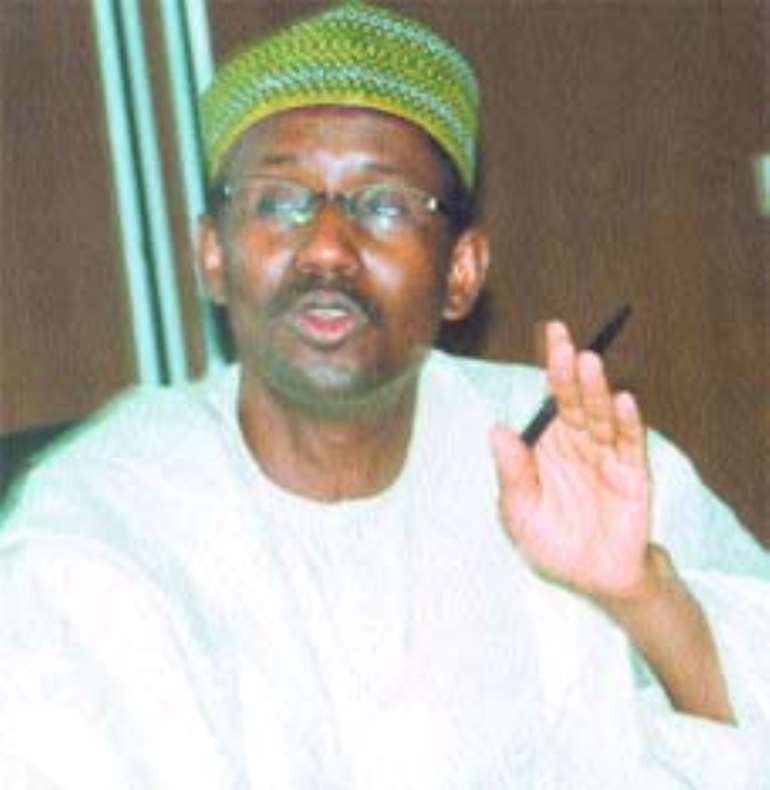NAIL ME IF YOU CAN, RIBADU DARES CRITICS

Ribadu
Former Chairman of the Economic and Financial Crimes Commission (EFCC), Mallam Nuhu Ribadu has debunked allegations that he converted property confiscated during his tenure to private use. Ribadu spoke yesterday as Guest of Honour at the convocation of Babcock University, Ilishan-Remo, Ogun State, where he was also conferred with a Honorary Degree in Law by the university.
Ribadu challenged those who made the allegation to come forward with substantiated evidence. The former EFCC helmsman who swore to God to attest to his claim affirmed that at no time did he or the commission convert any confiscated property.
He also urged Nigerians to pray for his future political career. Ribadu who returned to the country last Thursday, while recounting his 18 months in exile, said the period provided him with an opportunity to reflect on his exit from Nigeria and his national assignment.
On the fight against corruption, Ribadu whose rank was restored by the Police Service Commission (PSC) recently, declared that 'without a credible, systematic and enduring anti-corruption effort in our development effort, we would remain shackled forever.'
According to him, Nigerian citizens would remain in squalor, 'our cities will continue to fail, hunger and illiteracy will remain a norm, while human rights abuses, as well as electoral and judicial impunity, will reign supreme.' He added: 'there is merit in the argument that new times call for new strategies and that a sustainable anti-corruption programme in Nigeria must wear a new look.
We must invest, through massive resource allocation, a transparent as well as redouble our political will in model government agencies that produce results through an inclusive stakeholder charter of development.'
On education in Nigeria, Ribadu commended the management of the Babcock University (BU) for promoting leadership transformation in people's lives and its positive impact through pervading influence on graduates in service towards humanity.
'Core values enshrined in the cornerstone of its founding, are the very foundations that we must continue to seek to transform our country towards a just, fair, equitable, peaceful and truly free society. Values are the bedrock of progress, and our ability as a country that answers to the fundamental responsibilities of history will depend on the type of values that the BU have attempted to promote.''
He said, in helping Nigerians to answer the stubborn questions that confront the country today, values must be the leading edge of a vision to create a country in which billions of naira that were being pumped out of the Delta would not end up in the private accounts of those in power.
'A society in which our conscience will not be shattered when we visit the creeks of the Niger Delta, where over $400 billion dollars realised from oil sales in the last 50 years have been raised and erased by unrepentant rogues, a country in which we can all drive to Ilisan-Remo safely and without the craters and bumps, the gullies and the dangers, on the famous Lagos-Ibadan Expressway.
While restating his readiness to serve the country at any level, he said all hands must be on deck if the nation must achieve success in its fight against corruption. He thanked all those who prayed and stood by him during the period of his incarceration.
Stressing the importance of education Ribadu said education is a destiny in the important journey towards the sense of freedom and progress that 'I sketch for you here today. But as the reality of our nation has shown, if we do not build this project of education on the values of honesty, transparency, and accountability, education itself can become rapacious, a self-consuming monster that nurtures nightmarish visions.
Asking rhetorically, he said: 'Where are all the billions upon billions that our country makes?' Disclosing that Nigeria had spent over N1.1 trillion on education in the past five years, a whopping budget that appeared to have deepened more private pockets than any national institution.
He also used the occasion to urge government to do more in the area of women education, which, he said, was crucial to the development and growth of the nation. He was quick to give the example of Rwanda where women occupy at least 50 percent of the parliamentary seats.
The ex-EFCC boss who declined further questions about his travails after his exit from office arrived the scene in a convoy of vehicles. As he moved to the podium, he acknowledged cheers from his well-wishers including students who carried placards.
